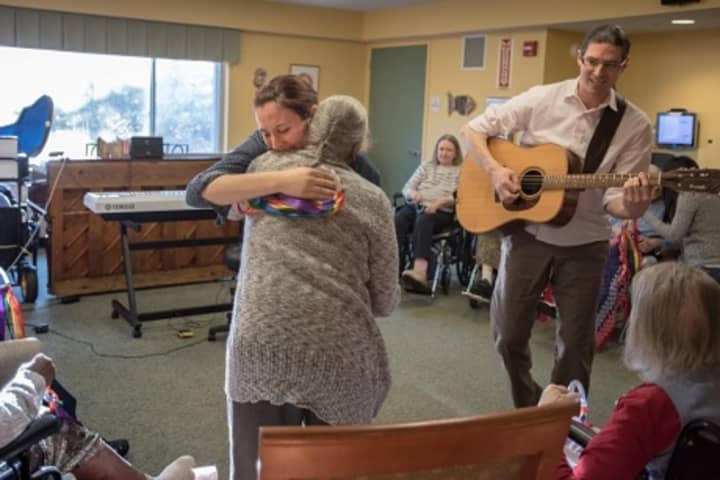Michael Lahue, a therapist at the non-sectarian, multi-service residential center, pointed to effect of music on one particular resident, a former jazz singer.
She doesn’t respond to much, Lahue said, but when he sings old songs or plays mustic for her, she lights right up.
“You can tell she’s engaged because she’s hearing something she recognizes,” he said.
Music therapy is a key piece of the dementia care at United Hebrew, officials there say.
For many residents affected by Alzheimer’s and other forms of dementia, singing, playing chimes, or simply listening can connect them to the world around them, even when nothing else can.
It also can calm down those who are restless and anxious, which is common among people dealing with dementia, said the center’s vice president, Geri Brooks.
“You take someone who may be very restless and put an iPod on and let them go back to their own time and they calm down and really enjoy the music,” she said. “You might have someone who has no movement and does not respond to you, but when you put on those headsets, you see that person’s head move.”
Lahue, who came to United Hebrew in March 2015, has studied seven languages in order to sing songs from residents’ childhoods in Italy, Portugal, or elsewhere.
Of all the recreational activities at United Hebrew, music therapy is the most effective, says Mila Levine, director of Therapeutic Recreation/Volunteers at the nursing and rehabilitation facility.
“Music is universal,” Levine said. “It’s something everyone responds to.”
Once a month, folk singer and percussionist Alessandra Belloni, an artist in residence at the Cathedral of St. John the Divine in Manhattan, comes to United Hebrew in to lead drum circles.
Calling the drum circle “really amazing,” Levine said: “Somehow, all these people, many of whom have no idea how to create music, are now part of a percussion band.”
Getting into the rhythm has a “very soothing effect,” he said.
Lahue sometimes works with an art therapist to link the approaches.
When a resident nearing her 101th birthday began to sing a song she knew as a 14-year-old, Lahue looked it up and identified it as “Honey,” recorded in 1929 by Rudy Vallee.
He shared it with an art therapist, who used the lyrics as a basis for a collage that the residents created as an art project.
It’s not only the residents who benefit from music therapy, Lahue said.
Visiting friends and family members can take part in it, too, and may find a new way to connect with a loved one.
“There are these kinds of opportunities to engage where the family member shares a memory that they take away that’s positive,” Lahue said.
For more information about the facility and its programs, call (914) 632-2804, or visit www.uhgc.org.
Click here to follow Daily Voice New Rochelle and receive free news updates.


